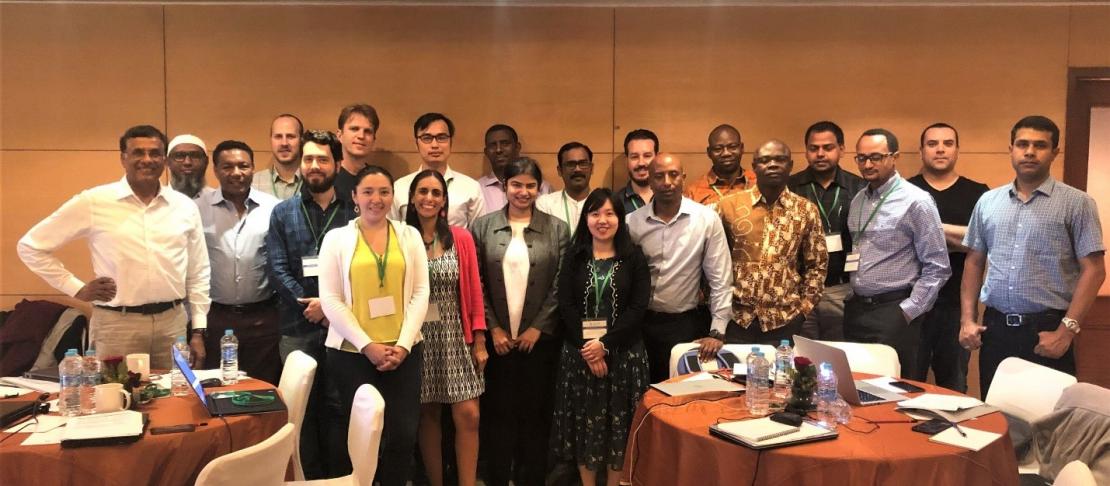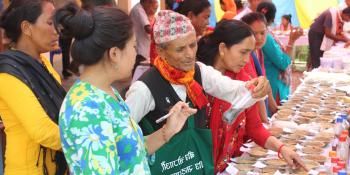Leveraging agricultural index insurance for economic development

The Global South comes together for collaborative research and capacity development on weather-based index insurance for climate risk management.
With increasing instances of climate extremes experienced globally, the world is falling short of options to secure agriculture from climate impacts. The growing interest in risk management is reflected in dedicated research and institutional efforts like InsuResilience and African Risk Capacity. The CGIAR Research Program on Climate Change, Agriculture and Food Security (CCAFS) has also been working together with its partners on accelerating climatic risk management.
In particular, CCAFS South Asia has developed a few innovative products for climate risk management including weather-based index insurance products. Additionally, a CCAFS Agriculture Monitor (CAM) was created to analyze seasonal weather and crop losses in real-time. With the vision of sharing this tool with other CCAFS regions, a workshop on CAM was organized last year. Different CCAFS regions made specific plans for co-developing and utilizing it in their regional policy initiatives. This year, CCAFS decided to conduct a follow-up workshop to plan the future roadmap of CAM and to mobilize stakeholders to facilitate the diffusion of advances in climate risk management.
Demystifying index insurance through hands-on exercises and developing a weather-trigger atlas
Weather based index insurance is an innovative risk management approach in which payouts are triggered based on specific weather indexes. In the workshop, the first session was kick-started by excel-based exercises on developing effective index insurance products. The CCAFS South Asia team presented their learnings from their insurance research, followed by other regions. These exercises were designed to clarify insurance concepts, which were otherwise obscure and considered too technical. After the first session of hands-on exercises, discussion was based around planning a region-specific atlas of weather indexes, which can catalyze research and increase transparency for all stakeholders in the insurance value chain-such as farmers, insuring agencies and the government.
The workshop was also planned as a follow-up for the previous workshop on South-South Collaboration, held in New York in July 2018, with a specific focus on the CAM tool and its development. All regions discussed the current status, usefulness, and relevance of CAM in their future plans for insurance, mechanisms for linking CAM in their regional policies, and action plans for its future progress. Region-wise specific work plans were made for the development of CAM as a regional/global tool for insurance in different countries (Senegal, Ethiopia, Vietnam and Guatemala).
Incubator sessions for advancing index insurance research and science-policy initiatives
Participants of the workshop also discussed advances in insurance including the use of satellite weather data and hybrid models for insurance contract design. These sessions catalyzed discussions across regions, underlining the potential of satellite data for piloting and scaling-out insurance. Combining multiple methods for developing weather-based index insurance products like statistical models, crop models and remote sensing was also recognized as an important area in insurance research. Presentations showcasing index insurance approaches followed in other countries helped in co-learning, increasing the awareness and knowledge capital of various regions.
The participants emphasized co-creating partnerships and using science-led outputs to facilitate policy initiatives across different regions. All regions decided on strengthening stakeholder engagement and involving national partners for innovations in index insurance initiatives and their gradual scaling up. Each region presented their vision of how to move ahead, including lessons learnt, key entry points and work plan to achieve the same. All the regions gave feedback on the workshop and planning such collaborative efforts in future.
Read more:
- Workshop report: South-South Collaboration in CCAFS for developing capacity on weather index insurance
- News Update: South-South collaboration to accelerate climate risk management
- Report: CCAFS Agriculture Monitor



